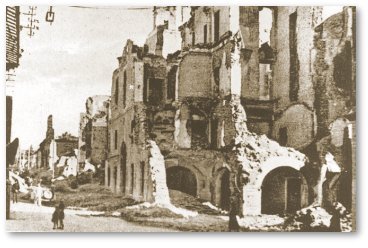Iz0chd
Menu principale:
Civitavecchia dopo i bombardamenti
Photo Gallery
Dalla testimonianza di Aldo Scussel
"Nel primo pomeriggio del 14 maggio 1943, per sette interminabili minuti - -Scussel non ricorda che l’incursione sia durata quindici o venti minuti- la nostra città fu sottoposta ad un feroce bombardamento aereo che ridusse il porto ed il centro ad un tragico scenario. Il Vescovo, Monsignor Luigi Drago, bergamasco, condiscepolo del futuro Papa Giovanni XXIII, usci tra le rovine a benedire i morti e i feriti, mentre suor Bianca Onorato, nostra concittàdina, dopo aver posto in salvo le sorelle e le orfane alla periferia della città si mise a disposizione per i soccorsi. "Ma la testimonianza piu significativa dello spirito pastorale di Monsignor Drago e suor Bianca doveva rivelarsi in un albergo trasformato in ospedale, dove fra centinaia di moribondi era stato trasportato anche un ufficiale superiore della Scuola Centrale di Cavalleria, orribilmente mutilato ed in pericolo di vita: questi, anticlericale di antica foggia, aveva disposto che nessun prete doveva accostarsi al suo capezzale in caso di morte. Monsignor Drago e suor Bianca vollero ugualmente recarsi dallo sventurato ricevendo energiche ripulse. Alla fine, pero, l'anima del morente si apri alla grazia e volle vicino a sé i due ostinati religiosi e mon dando chiari segni di sincera conversione, implorando il perdono... "Il pomeriggio del 15 maggio 1943 il Re d’Italia e la Regina Elena vennero a Civitavecchia e furono accompagnati dalle poche autorita locali e dal sotto- scritto sulla terrazza Marconi, ove poterono prendere visione del disastro provocato nel porto dal bambardamento. Il Re era impietrito dal dolore, mentre la Regina Elena piangeva in silenzio. "Il 18 maggio 1943 il federale di Roma, Pescosolido, guidava una colonna di autocarri carichi di viveri fra la popolazione disastrata di Civitavecchia. I viveri furono presi in consegna dal segretario dell’ECA e depositati presso la Casa del Balilla, attuale sede comunale. Nei giorni seguenti furono distribuiti ai senza tetto e agli indigenti."







From the testimony of Aldo Scussel
"In the early afternoon of 14 May 1943, for seven interminable minutes - non-Scussel notes that the raid lasted fifteen or twenty minutes-our city was subjected to a fierce bombardment that reduced the port and the center of a tragic scene . The bishop, Monsignor Luigi Drago, Bergamo, students of the future Pope John XXIII, emerged from the ruins to bless the dead and wounded, while Sister Bianca Onorato, our fellow citizens, after giving rescued the sisters and orphans on the outskirts of the city began to provide for relief. "But the most significant testimony of the spirit of pastoral Drago Bishop and Sister White had become transformed into a hotel in the hospital, where among the hundreds of dying was also transported to a top official of the Central School of Cavalry, horribly mutilated and in danger of living: these old anticlerical foggia, had directed that no priest was to approach his bedside in the event of death. Bishop and Sister Bianca Drago also wanted to go by the unfortunate receiving vigorous rejection. In the end, however, the soul of the dying is open to the grace and wanted him to close the two stubborn religious and mon giving clear signs of sincere conversion, imploring forgiveness ... "The afternoon of May 15th 1943 the King of Italy and Queen Helen came to Civitavecchia and were accompanied by a few local authorities and signed Marconi on the terrace, where they could see the pollution in the port from bambardamento. The King was petrified by suffering, while the Regina Elena wept in silence. "On 18 May 1943 the Federal Rome, Pescosolido, led a column of trucks loaded with food supplies among the affected population of Civitavecchia. The food was taken over by the UN secretary and lodged with the House of Balilla, current home town. In the days following were distributed to the homeless and needy. "